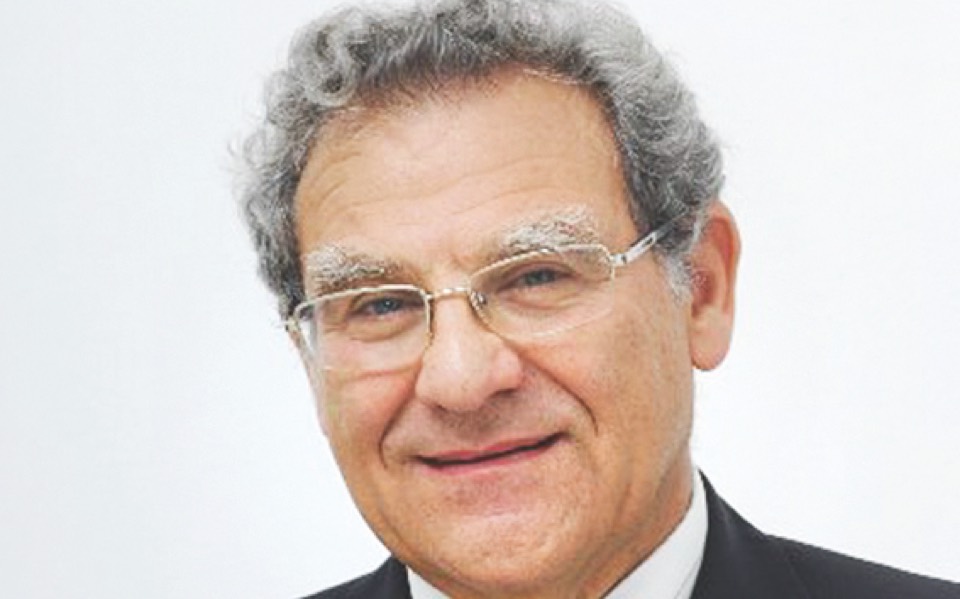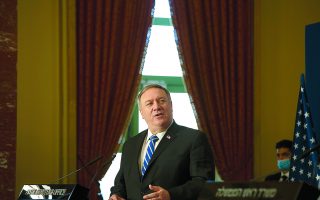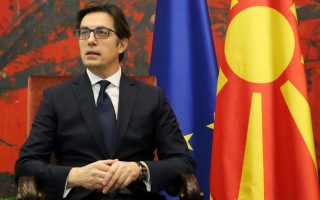Israeli expert sees US role in East Mediterranean waning

The United States does not have a comprehensive strategy for the Eastern Mediterranean, according to Efraim Inbar, president of the Jerusalem Institute for Strategy and Security (JISS) and founding director of the Begin-Sadat Center for Strategic Studies (1993-2016), who is regarded as one of the pre-eminent experts on Israeli foreign relations and the border region more generally.
Responding to a question by Kathimerini on a recent non-paper indicating that America may withdraw support for the EastMed gas pipeline project, Inbar, who is also a professor of political studies at Bar-Ilan University, notes that Washington is “very ideological” and does not have a specific policy for the region, while adding that he is “skeptical” about the Biden administration’s “capability to think strategically.”
The trilateral relationship
In any case, says Inbar, developments on the energy front will not affect Israel’s relationship with Greece and Cyprus, its partners in the EastMed project and other initiatives. “The discussions that have been going on for several years have a strategic nature. Energy is just a part of it. And generally, money is less important to strategic decisions. Our trilateral relationship is based on strategic interests,” he says.
For the strategic analyst, Turkey continues to pose a problem though. “We see a much more aggressive Turkey that is fueled by Ottoman and Islamist impulses. And their appetite for energy is just a part of it. They want to be an energy bridge,” says Inbar.
In general terms, Inbar believes that the American stance is being fueled by ideological concerns. “We see a radical Islamist threat in Turkey, Gaza, in the government in Tripoli [in Libya] and in the Muslim Brotherhood. Americans are criticizing Sisi for human rights, asking for free elections like it is a panacea for everything,” he says, referring to Egyptian President Abdel Fattah Al-Sisi. “So, they are very ideological,” he adds.
With regard to Egypt more specifically, Inbar agrees with it becoming a liquified natural gas transportation hub, but is skeptical as to what extent Cairo has the investment capital to support the production of clean energy.
Russia and China
Asked by Kathimerini whether decision making in Washingtonvis-a-vis the Eastern Mediterranean is influenced by relations with Moscow and Beijing, Inbar says “of course [it is] preoccupied with Russia and China.”
“Russia is present. The Chinese Belt and Road project ends in the East Mediterranean. I wish the Americans were paying more attention in the East Mediterranean,” he adds.
Commenting on the economic significance of a project like EastMed that would bring natural gas to Europe via Cyprus and Greece, Inbar says that “without this pipeline we will be more reliant on Russia.” However, he also believes that Europe needs to take a more active stance on the issue. “The Americans don’t see the bigger picture. Were they asked to support it? To give money? It should be a European decision,” he says.
Asked whether a decision to withdraw support from the project would serve Ankara or whether it may be intended to send a signal to Turkish President Recep Tayyip Erdogan that would relieve him of some pressure, Inbar answers in the negative, interpreting the position as related to the Biden administration’s policymaking weaknesses.
“I don’t think that the Biden administration is friendly to Erdogan. Turkey was not invited to the Democracy Forum in December. The Trump administration was much more friendly. Turkey also has limited influence in Washington,” he says.
Greece, adds Inbar, “is in a much better position.”
The non-paper
As far as the non-paper indicating Washington’s intention not to support the EastMed project is concerned, Inbar does not see it as heralding a mediation between Turkey and Greece. “I think that Americans at this stage don’t want to mediate between Turkey and Greece,” he says.
He believes, in fact, that Washington is doing very little even on the important domestic front, such as, for example, helping the opposition against Erdogan. “Turkey will be more peaceful if it gets rid of Erdogan. They should encourage opposition,” he notes.
As for the Eastern Mediterranean more generally, Inbar summarizes the situation as such: “If we look at the systemic environment, we see a decreased US interest in the region. I respect that. That gives much more freedom of action for local actors. Like Greece, Israel and Turkey but also Russia. Turkey wants a role. It is a revisionist state that wants to change things. Of course, it will be constrained by economic reasons because of Erdogan’s policies.”
Turkey, he adds, is developing homegrown military capabilities, is selling abroad and has “ambitions,” including its missile program and “eyeing nuclear capabilities.”
“The Americans are not here,” he says, adding that this allows “local powers” to step in.
He refers to Egypt in particular as a regional force, but also to the United Arab Emirates. “The UAE is more involved than before. They are trying to buy Erdogan, but I don’t think they will be successful,” he says.
“Overall, we will see a much more chaotic Eastern Mediterranean in the coming years,” Inbar warns.
Even though he stresses that this is the “worst-case analysis,” he notes that Turkey is becoming increasingly Islamicized and is using Libya as a means of piling pressure on Europe by encouraging migration inflows. Overall, he sees a “more antagonistic relationship between the West and Turkey,” while commenting that “NATO has no mechanism to get rid of a problematic partner.”
This relationship between Turkey and the West, says Inbar, gives Ankara greater freedom of movement, which means that the situation is unlikely to change significantly anytime soon.





